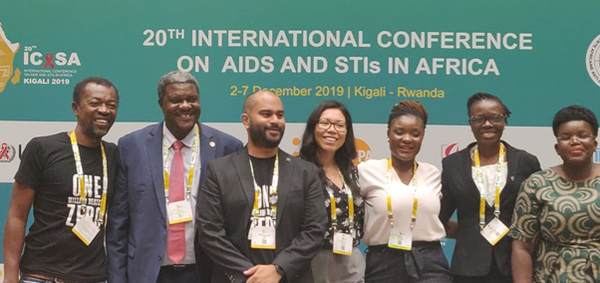ICASA 2019: People who use drugs continue to be side-lined in the HIV response
The 20th International Conference on AIDS and STIs in Africa was held from the 2-7th December in Kigali, Rwanda. It brought together over 6000 participants from across Africa and beyond. The conference took place under the banner of “AIDS FREE AFRICA - Innovation, Community, and Political Leadership”.
The aim of the conference was to engage the whole continent in the Post-SDG Framework, in order to ensure the sustainability of the response and achieve the 90/90/90 goals.
But it was clear from the conference that an AIDS Free Africa remains a mirage, in a context in which the human rights of people who use drugs are acutely neglected. It is more urgent than ever that governments, and all relevant stakeholders, join arms in ramping up efforts to implement evidence-based harm reduction programmes for people who inject drugs in Africa.
The conference did a commendable job in providing an overview of progress, including by showcasing successful HIV interventions, and identifying remaining gaps. However, the spaces dedicated to conversations about the needs of people who use drugs were visibly few.
Considering the enormous challenges the HIV response faces in the African continent when it comes to people who inject drugs (including high prevalence rates, poor data collection and availability, limited service provision, criminalisation and exclusion, among many others), one would have expected harm reduction and drug policy reform would feature prominently in many of the sessions. Alas, this was far from the case. And the same could be said about conversations on making the Universal Health Coverage (UHC) process work for key populations.
Overall, many of us, representing civil society and networks of affected communities, felt the discussions were not honest enough. We continue to dig our heads in the sand while our communities suffer. We must ask ourselves: How realistic can the AIDS Free Africa agenda be if we leave behind a whole key population?
Despite these major shortcomings, the [very] few events focusing on harm reduction and issues affecting people who use drugs at ICASA were a great success; including two major satellite discussions and 5 poster presentations.
These sessions focused on progress and policies with regard to harm reduction in Africa. They provided an overview of the various programmes and policies in place, and highlighted success stories that should serve as learning for the HIV community as a whole. The events were also an opportunity to take stock of remaining challenges and imagine how different our continent’s future could be, if only the harm reduction response were adequately funded and supported!
For IDPC members attending, ICASA was a great opportunity to meet, discuss and strategise. We all agreed on the importance of continuing to build on each other’s experiences to improve the work on the ground and highlighted the key transformative role that the decriminalisation of drugs for personal use could have on most vulnerable communities.
ICASA also saw the Support. Don’t Punish campaign extend its networks, sharing its message with dozens of people who stopped by our collective booth to join the Photo Project and learn about harm reduction.
As we move towards ICASA 2021, in Uganda, it seems important to push for harm reduction to make it to the top of the agenda; for the rights and wellbeing of people who use drugs to make it to the top of the agenda. Supported by data, research and the wealth of experience of the communities that we belong to and stand in solidarity with, we know that we cannot be successful in achieving an Africa free from AIDS if we continue down the path of neglect and complacency.
Uganda 2021 must see a new ICASA; one that embraces all affected communities, and especially those who remain relegated to the margins. We cannot afford another conference in which people who use drugs and harm reduction are not central to the discussion.
Related Profiles
- International Drug Policy Consortium (IDPC)
